
Computational Thermal Sciences
Scope & Guideline
Illuminating the Future of Thermal Sciences
Introduction
Aims and Scopes
- Thermal Transport Phenomena:
Research concerning the mechanisms of heat transfer across various mediums, including solid, liquid, and gas phases, with applications in engineering and environmental science. - Computational Fluid Dynamics (CFD):
Utilization of numerical methods and algorithms to analyze and simulate fluid flow and heat transfer, often through complex geometries and conditions. - Multiscale Modeling:
Investigating thermal phenomena at different scales, from molecular to macroscopic levels, to understand and predict the behavior of materials and systems. - Nanofluids and Advanced Materials:
Exploration of the thermal properties and behaviors of nanofluids and other advanced materials, focusing on their applications in energy systems and thermal management. - Magnetohydrodynamics (MHD):
Study of the behavior of electrically conducting fluids in the presence of magnetic fields, relevant for applications in energy production and manufacturing. - Thermal Energy Storage Systems:
Research into methods and technologies for storing thermal energy, including phase change materials and innovative heat exchanger designs. - Renewable Energy Applications:
Investigation of thermal processes in renewable energy systems, including solar thermal, geothermal, and bioenergy applications.
Trending and Emerging
- Machine Learning in Thermal Sciences:
The integration of machine learning techniques for modeling and predicting thermal behaviors and system performance is gaining traction, reflecting the broader trend of AI applications in engineering. - Advanced Numerical Methods:
There is an increasing emphasis on the development and application of advanced numerical methods, such as meshless methods and Lattice Boltzmann simulations, to tackle complex thermal problems. - Thermal Behavior of Nano-Materials:
Research exploring the thermal properties and applications of nanomaterials is on the rise, driven by their potential in enhancing thermal performance in various applications. - Environmental and Climate Impact Studies:
Publications focusing on the thermal aspects of environmental issues, including climate change impacts and energy efficiency in systems, are becoming more prominent. - Hybrid Energy Systems:
An emerging focus on the thermal dynamics within hybrid energy systems, which combine renewable energy sources with traditional methods, is evident in recent research. - Thermal Management in Electric Vehicles:
With the rise of electric vehicles, studies on thermal management systems specific to battery cooling and thermal regulation are increasingly significant.
Declining or Waning
- Classical Heat Transfer Analysis:
Traditional methods of heat transfer analysis, such as simple conduction and convection equations, appear to be waning in favor of more complex and computationally intensive approaches. - Experimental Heat Transfer Studies:
There has been a noticeable decrease in the number of papers focused solely on experimental investigations, as computational models gain prominence in the research landscape. - Simplistic Models in MHD:
The use of overly simplistic models for magnetohydrodynamic flows is declining as researchers increasingly adopt more sophisticated and realistic approaches. - Static Thermal Systems:
Research focusing on static or non-dynamic thermal systems is less prevalent, indicating a trend towards dynamic and transient thermal analyses.
Similar Journals
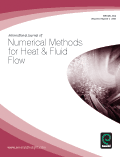
INTERNATIONAL JOURNAL OF NUMERICAL METHODS FOR HEAT & FLUID FLOW
Unleashing the Power of Computational Analysis in Engineering.INTERNATIONAL JOURNAL OF NUMERICAL METHODS FOR HEAT & FLUID FLOW, published by EMERALD GROUP PUBLISHING LTD, is a premier platform dedicated to advancing the field of numerical methods applied to heat and fluid flow analysis. With an ISSN of 0961-5539 and an E-ISSN of 1758-6585, this journal has been a vital resource since its inception in 1991, covering cutting-edge research right up to 2024. It is highly regarded within various disciplines, as evidenced by its impressive ranking in the 2023 Scopus categories, which places it in the Q1 tier for Computational Mechanics and a Q2 tier for Aerospace Engineering and Mechanical Engineering. This authoritative journal holds significant importance for researchers, professionals, and students who are keen on expanding their knowledge and addressing challenges in thermal and fluid dynamics through innovative computational techniques. Although the journal does not provide Open Access options, its rigorous peer-review process and high-impact publication standards ensure that it remains an essential tool for those involved in engineering advancements and applied mathematics.
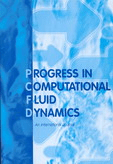
PROGRESS IN COMPUTATIONAL FLUID DYNAMICS
Bridging Theory and Application in Computational Fluid DynamicsPROGRESS IN COMPUTATIONAL FLUID DYNAMICS, published by InderScience Enterprises Ltd, is a vital journal in the realms of Computer Science Applications and Condensed Matter Physics. Established in 2001, this journal serves as a platform for disseminating innovative research findings and technological advancements in computational fluid dynamics, targeting both theoretical and applied aspects. With a current impact factor positioning it in the Q4 quartile for its fields, it captures a wide array of topics including numerical methods, simulation techniques, and real-world fluid dynamics applications, fostering dialogue among researchers, practitioners, and educators alike. Although it does not provide Open Access options, it remains an important resource for those investigating fluid dynamics phenomena. As it continues to evolve through 2024, PROGRESS IN COMPUTATIONAL FLUID DYNAMICS is positioned to contribute significantly to the scientific community, addressing core challenges while promoting collaboration and knowledge exchange.
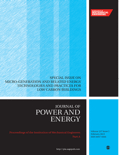
PROCEEDINGS OF THE INSTITUTION OF MECHANICAL ENGINEERS PART A-JOURNAL OF POWER AND ENERGY
Pioneering Discoveries in Power Generation and EfficiencyPROCEEDINGS OF THE INSTITUTION OF MECHANICAL ENGINEERS PART A-JOURNAL OF POWER AND ENERGY, published by SAGE PUBLICATIONS LTD, is a pivotal journal dedicated to advancing the fields of mechanical engineering and energy technology. With a history spanning from 1983 to 2024, this journal provides a respected platform for researchers and practitioners to disseminate findings that address contemporary challenges in power generation, energy efficiency, and sustainable engineering practices. As evidenced by its quarter ranking in Q3 within the categories of Energy Engineering and Power Technology, and Mechanical Engineering, it serves as a significant resource for academics aiming to enhance their understanding and explore innovation in these critical areas. While currently not an open-access journal, the research published here is invaluable for both ongoing education and professional practice, making it an essential read for anyone engaged in the engineering disciplines.

Archives of Thermodynamics
Elevating Understanding of Energy TransformationsArchives of Thermodynamics is a reputable journal dedicated to the field of thermodynamics, published by the esteemed POLISH ACADEMY OF SCIENCES. With a robust history since its inception in 2003, this journal serves as a critical platform for disseminating high-quality research aimed at advancing knowledge and technology in thermodynamic systems and processes. Recognized for its contribution to the field, it holds a Q3 ranking in the Physics and Astronomy (miscellaneous) category as of 2023, with a respectable Scopus rank of #148 out of 243, placing it within the 39th percentile. Although it follows a traditional access model, the journal's commitment to scholarly excellence ensures that researchers, professionals, and students alike can benefit from its rich archives and ongoing discussions within the scientific community. Situated in Warsaw, Poland, the journal not only reflects a regional dedication to scientific progress, but also engages with global audiences interested in the evolving landscape of thermodynamic research.
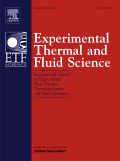
EXPERIMENTAL THERMAL AND FLUID SCIENCE
Transforming experimental insights into engineering excellence.EXPERIMENTAL THERMAL AND FLUID SCIENCE is a prestigious academic journal published by Elsevier Science Inc, dedicated to advancing the fields of thermal and fluid sciences. With a strong focus on innovative experimental research, it plays a crucial role in disseminating new knowledge and techniques across multiple domains, including Aerospace Engineering, Chemical Engineering, Fluid Flow and Transfer Processes, Mechanical Engineering, and Nuclear Engineering. Holding a notable impact factor and ranking in the Q1 quartile across these categories since 2023, the journal is recognized for its high-quality contributions, which appeal to a diverse audience of researchers, industry professionals, and students alike. Additionally, with dedicated coverage from its inception in 1988 to projections extending through 2025, EXPERIMENTAL THERMAL AND FLUID SCIENCE provides a vital platform for sharing advancements in experimental techniques and findings that shape the future of engineering and applied sciences.

Frontiers in Heat and Mass Transfer
Connecting Researchers Through Open Access KnowledgeFrontiers in Heat and Mass Transfer is a premier open-access journal published by TECH SCIENCE PRESS that focuses on the interdisciplinary field of heat and mass transfer. Established in 2010, this journal has been pivotal in disseminating high-quality research aimed at advancing the understanding of energy and material transport phenomena. With an impressive commitment to open access, it ensures that all published articles are readily available to researchers, practitioners, and students globally, promoting knowledge sharing and collaboration. The journal currently holds a Q3 ranking in key categories such as Engineering, Materials Science, and Physics and Astronomy, as well as notable positioning in Scopus rankings. With a forward-looking scope extending from 2010 to 2024, Frontiers in Heat and Mass Transfer continues to be an essential platform for innovative research, fostering the development of practical applications across various scientific and engineering domains. We invite you to explore the latest contributions to this evolving field and consider this journal as a vital resource for your academic and professional growth.

Journal of Thermal Science
Transforming thermal science into practical solutions.Journal of Thermal Science is a prestigious academic publication dedicated to the field of thermal science and its applications. Published by SPRINGER, this journal has been at the forefront of knowledge dissemination since its inception in 1992 and continues to provide a platform for researchers and professionals to share their innovative findings through high-quality peer-reviewed articles. With its ISSN 1003-2169 and E-ISSN 1993-033X, the journal covers a diverse array of topics related to thermal processes, materials, and engineering, significantly contributing to advancements in Condensed Matter Physics. In the latest rankings, it holds a commendable Q2 category in the 2023 quartiles, further highlighting its relevance with a Scopus ranking of #183/434 in its field, placing it in the top 57th percentile. While currently not offering open access, the journal strives to bridge the gap between theory and practice, making substantial impacts on both academia and industry. Its continued exploration of cutting-edge research ensures that it remains a key resource for students and professionals looking to expand their knowledge and foster innovation in thermal sciences.
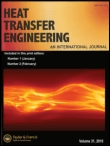
HEAT TRANSFER ENGINEERING
Transforming concepts into cutting-edge thermal applications.HEAT TRANSFER ENGINEERING is a leading international journal published by Taylor & Francis Inc, dedicated to advancing the field of heat transfer and thermal engineering. With a strong focus on the key aspects of Condensed Matter Physics, Fluid Flow and Transfer Processes, and Mechanical Engineering, this journal covers a comprehensive range of topics from experimental studies to theoretical analysis, aiming to foster innovative research and practical applications. Since its inception in 1979 and continuing through 2024, the journal has established itself as an essential resource for researchers and industry professionals alike, reflected in its solid rankings within Scopus—holding a Q2 quartile classification in multiple engineering disciplines. Although not open access, the journal ensures broad accessibility through institutional subscriptions, making cutting-edge research readily available. With its rigorous peer-review process and commitment to quality, HEAT TRANSFER ENGINEERING plays a crucial role in shaping the future of thermal management solutions and engineering practices.

HEAT TRANSFER RESEARCH
Transforming Ideas into Impact in Thermal SciencesHEAT TRANSFER RESEARCH is a leading academic journal published by Begell House Inc that focuses on the dynamic and evolving fields of heat transfer, fluid flow, and mechanical engineering. With an ISSN of 1064-2285 and an E-ISSN of 2162-6561, this journal serves as a critical platform for researchers and professionals seeking to disseminate innovative findings and advancements in these interrelated disciplines. Covering converged years from 1992 to 2024, HEAT TRANSFER RESEARCH has established its impact in the academic community, achieving a 2023 ranking of Q3 in Condensed Matter Physics and Q2 in Fluid Flow and Transfer Processes. It currently occupies a percentile rank ranging from 44th to 54th across several Scopus categories, underscoring its relevance and contribution to the scientific discourse. While Open Access options are not available, the journal remains committed to providing high-quality research and insights that shape the future of thermal sciences. Accessible to both seasoned professionals and aspiring students, HEAT TRANSFER RESEARCH is indispensable for anyone looking to stay ahead in the ever-changing landscape of engineering and applied physics.

JOURNAL OF ENGINEERING PHYSICS AND THERMOPHYSICS
Exploring Innovative Solutions in Thermal and Physical EngineeringJOURNAL OF ENGINEERING PHYSICS AND THERMOPHYSICS, published by Springer, is a vital resource for researchers and professionals in the fields of engineering physics and thermophysics. With an ISSN of 1062-0125 and an E-ISSN of 1573-871X, this esteemed journal has been disseminating high-quality research since its inception, covering critical advancements in both condensed matter physics and various engineering disciplines. Despite its classification within the third quartile in both Scopus categories for 2023, the journal remains a significant conduit for innovative studies that push the boundaries of knowledge in thermal and physical engineering, with converged years spanning from 1992 to 1997 and 2004 to 2024. The journal does not offer open access, which means subscribers and institutions have exclusive access to its rich content. As the field continues to evolve, JOURNAL OF ENGINEERING PHYSICS AND THERMOPHYSICS plays an essential role in fostering scholarly discussions and supporting the academic community in tackling contemporary engineering challenges.